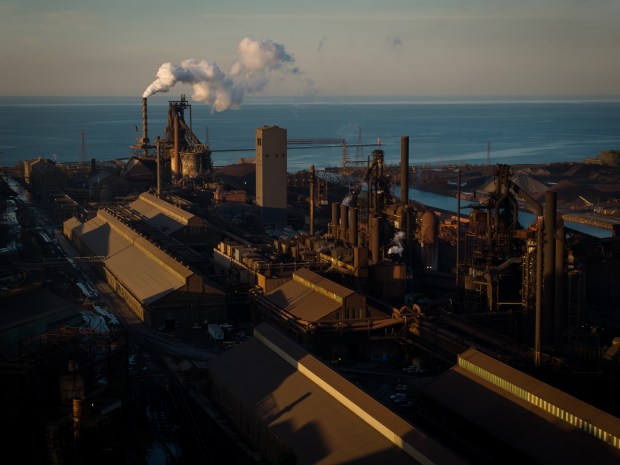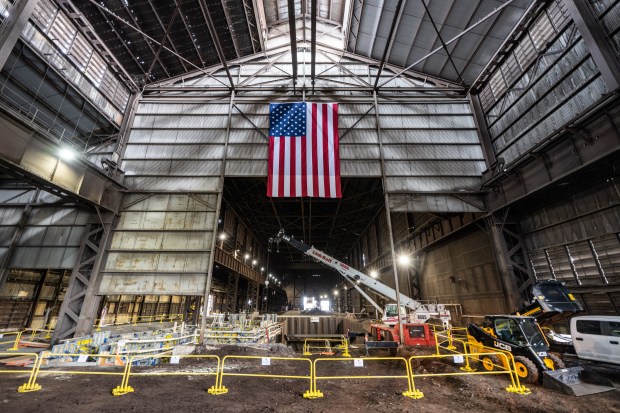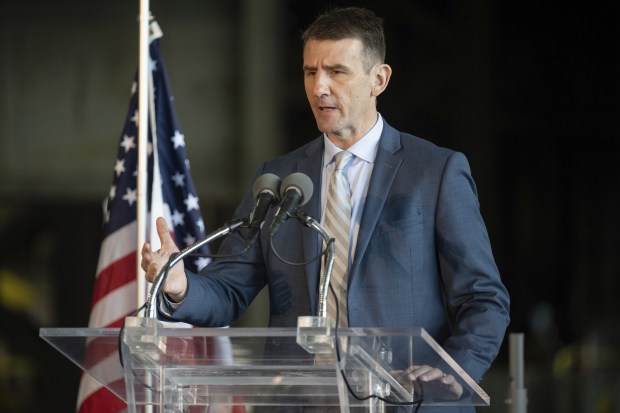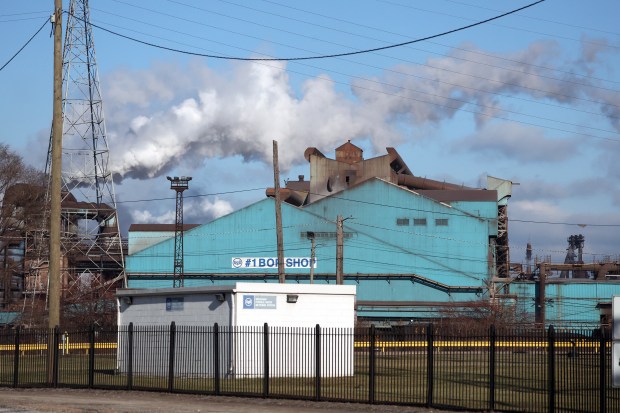More than one year after a potential purchase of U.S. Steel was announced, President Joe Biden has officially blocked the deal.
“It is my solemn responsibility as President to ensure that, now and long into the future, America has a strong domestically owned and operated steel industry that can continue to power our national sources of strength at home and abroad,” Biden said in a statement, “and it is a fulfillment of that responsibility to block foreign ownership of this vital American company. U.S. Steel will remain a proud American company — one that’s American-owned, American-operated, by American union steelworkers — the best in the world.”
Biden on Friday stopped Japanese company Nippon Steel from buying U.S. Steel for nearly $15 billion. If approved, the deal would have had major impacts on Northwest Indiana, specifically Gary.
U.S. Steel employs about 4,500 employees at Gary Works and its Midwest Plant in Portage.
Gary Mayor Eddie Melton has repeatedly expressed support for the deal, which would have brought more than $1 billion to the Gary Works facility. After Biden’s decision, Melton said he was deeply disappointed, adding that he thinks the transaction was best for steelmaking families.
Melton has discussed the deal with mayors nationwide, members of the Congressional Black Caucus in Washington, D.C., steelworkers and union leadership, he said in a Friday statement.
The stakes are high for Gary, Melton added.
“Yesterday, we had a guaranteed deal in hand,” he said. “The potential sale of U.S. Steel to Nippon Steel presented a significant opportunity for Gary and the American steel industry to grow and prosper. Now, we face an uncertain future, with Gary Works potentially losing investment and jobs.”
Nippon announced in August that — if the deal is approved — it would invest about $300 million into the facility, specifically the blast furnace. With the investment, the Gary Works’ furnace would have its life extended by up to 20 years.
Northwest Indiana environmental activists have had concerns about investing in the blast furnace, asking instead for an investment in direct reduction furnaces. Blast furnaces are outdated, activists have said, and direct reduction would be more environmentally and economically friendly because it could cut carbon dioxide emissions in half.
Nippon Steel Vice Chairman Takahiro Mori said the company planned to invest $1 billion into Gary Works. The company also planned to invest nearly $3 billion into its union-represented facilities.
The Committee on Foreign Investment in the United States panel was supposed to refer its decision to Biden on Dec. 23, but according to a statement from U.S. Steel, it was unable to reach a consensus. The committee referred the decision to the president, giving him 15 days to act.
“As a committee of national security and trade experts across the executive branch determined, this acquisition would place one of America’s largest steel producers under foreign control and create risk for our national security and our critical supply chains,” Biden said in his Friday statement.
An August letter from the Treasury Department on behalf of CFIUS offered justification for blocking the deal by arguing it is a threat to an industry critical not just for the production of military equipment, but also for infrastructure, Bloomberg reported on Dec. 10.
Nippon Steel committed to various mitigation measures, which CFIUS didn’t consider its decision, Melton said in his Friday statement.
In a joint statement, U.S. Steel and Nippon Steel condemned Biden’s decision, calling it unlawful on Friday. The companies claimed the process was manipulated and the future of steelworkers was sacrificed to advance the president’s political agenda.
“The President’s statement and Order do not present any credible evidence of a national security issue, making it clear that this was a political decision,” the statement said. “Following President Biden’s decision, we are left with no choice but to take all appropriate action to protect our legal rights.”

The companies have “diligently and transparently engaged with CFIUS,” according to the statement, and found that the deal would strengthen national security. The steel companies also claim the outcome was pre-determined and sends a “chilling message” to allied countries.
“We will never give up on pursuing business in the U.S. for the benefit of the U.S. domestic stakeholders,” the statement said. “We continue to believe that a partnership between Nippon Steel and U.S. Steel is the best way to ensure that U.S. Steel, and particularly its USW-represented facilities, will be able to compete and thrive well into the future…”
United Steelworkers haven’t supported the deal, and union President David McCall issued a statement following Biden’s decision, saying it was welcomed.
In a Friday news conference, McCall said he has no doubt that Biden’s decision was best for national security and the union’s members.
“Throughout the past year, as the proposed transaction was under review, the union’s first and only concern has been the long-term viability of our facilities and our members’ jobs as we look to ensure a strong domestic steel industry well into the future,” McCall said.
McCall hasn’t met with Biden regarding the deal in the last few weeks, he said Friday. Although U.S. Steel has vowed to take court action, McCall said he’s not worried the decision will change and that everyone’s done what they can.
In December, Melton and two Pennsylvania mayors — Cletus Lee from North Braddock and Chris Kelly from West Mifflin — were critical of USW leadership’s position on the deal.
“We have been through a lot of struggle in our communities, but the USW’s behavior is a new low,” the mayors’ statement said. “We know that the members would be disappointed if they were in the room to hear what we heard.”
USW leadership met with the mayors and Nippon representatives in December and decided the company had no intention of addressing problems the union has with the sale, including its commitment to long-term success of facilities and job security.
McCall believes the company can continue to succeed without Nippon’s help, saying that U.S. Steel’s financial performance proves that.

The union leader isn’t concerned that President-elect Donald Trump could reverse Biden’s decision after his Jan. 20 inauguration.
“President Trump has indicated on a couple of different occasions that he understood what the risks to national security would be,” McCall said. “He’s publicly stated that he would be against the deal.”
U.S. Rep. Frank Mrvan, D-Highland, said in a statement Friday that he’s had distrust over the deal. Mrvan highlighted Nippon Steel’s involvement in 12 anti-dumping and countervailing duty orders from the U.S. International Trade Commission and an active investigation into importing hot-rolled steel sheet products.
“These cases mean that American industry and workers have been harmed, notably through job losses, by Nippon willfully violating our nation’s trading laws,” Mrvan said in his statement.
Construction vehicles are parked at the site of the construction of a pig iron caster at U.S. Steel Gary Works on Thursday, May 26, 2022. (Kyle Telechan for the Post-Tribune)
Although they’ve wanted direct reduction furnaces, members of Gary Advocates for Responsible Development have never taken a position on U.S. Steel’s ownership, the organization said Friday in a statement.
“We have always believed that no matter who owns Gary Works, steelworking there should be modernized with the new technology that can continue to operate the mill in a cleaner, greener way that preserves jobs and creates a safer environment for workers and residents alike in Gary,” the statement said.
Just Transition Northwest Indiana also believes whoever owns U.S. Steel should implement technologies that are best for the steel industry jobs, community health and environment. Green technology ensures long-term investments into the nation’s communities and climates.
“The opportunity is now to be on the right side of history and make this transition to sustainable steel in Northwest Indiana and across the nation,” JTWNI’s statement said. “This is an essential component of any future developments on this issue, not on the table for this deal but cannot be ignored.”

U.S. Rep. Frank Mrvan, D-Highland, speaks during an event celebrating the construction of a pig iron caster at U.S. Steel Gary Works on Thursday, May 26, 2022. (Kyle Telechan for the Post-Tribune)
Industrious Labs, an environmental organization focused on cleaning up industries, found in an October report that coal-based steelmaking contributes to an estimated 892 premature deaths, nearly 250,000 asthma symptoms annually and from $6.9 to $13.2 billion in health costs.
The organization released a statement following Biden’s decision Friday, saying coal-based steel and coke plants will continue to contribute to harmful emissions.
“Whoever owns and operates U.S. Steel facilities must invest in clean, modern iron and steel production that protects public health and creates good union jobs,” Steel Director Hilary Lewis said in a statement. “Investing in clean steelmaking will keep American steel globally competitive for generations to come.”
The Sierra Club, a national grassroots organization, called Biden’s blockage of the deal a victory in their Friday news release. Nippon Steel’s policies are outdated and pollution-intensive, they said.
The Sierra Club highlighted Gary Works, saying the facility would’ve had coal-based steelmaking policies until 2050. Nippon planned to make similar investments to all six currently operating blast furnaces by 2030, the news release said.
Nippon Steel’s plans didn’t address burdens that communities around the mills bear, the Sierra Club’s release said.
“Exacerbating harm to our clean air and water, our health, and our collective future is a clear human security risk to our nation,” Sierra Club Executive Director Ben Jealous said. “The Sierra Club applauds President Biden for recognizing that and taking decisive action to protect Americans.”
Bloomberg contributed.



